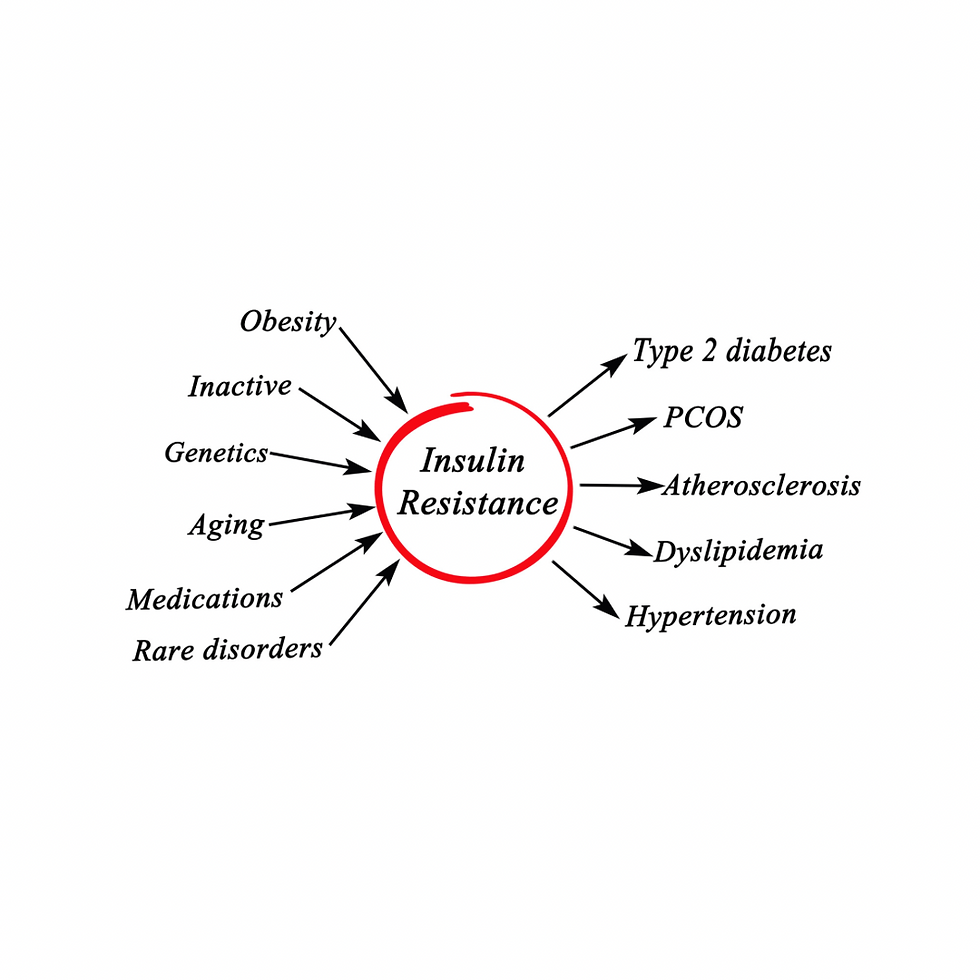7 Steps to Overturn Insulin Resistance
- Angelica Clark
- Jun 17, 2023
- 3 min read
Updated: Jun 19, 2023
Insulin resistance affects millions of people worldwide, increasing the risk of type 2 diabetes and cardiovascular disease. However, with lifestyle changes and proactive measures, you can reverse insulin resistance and regain control of your metabolic health. In this blog post, we will explore seven essential steps to help you overturn insulin resistance and achieve hormonal balance.

Step 1: Adopt a Healthy Diet
Start by adopting a healthy, balanced diet. Focus on whole foods such as fruits, vegetables, lean proteins, and whole grains. Minimize processed foods, refined carbohydrates, and sugary beverages, as they can spike blood sugar levels. Aim for foods rich in fiber to regulate blood sugar. Incorporate healthy fats like avocados, nuts, and olive oil, which improve insulin sensitivity.
Step 2: Engage in Regular Physical Activity
Regular exercise is crucial in combating insulin resistance. Aim for at least 150 minutes of moderate-intensity aerobic exercise per week, along with strength training exercises. Exercise increases insulin sensitivity, allowing cells to utilize glucose efficiently. Find activities you enjoy and make them a regular part of your routine.
Step 3: Prioritize Weight Management
Maintaining a healthy weight is vital to reversing insulin resistance. Excess body fat, particularly around the abdomen, contributes to insulin resistance. Create a calorie deficit through a healthy diet and regular exercise to promote gradual, sustainable weight loss.
Step 4: Intermittent Fasting
Consider incorporating intermittent fasting into your routine. This eating pattern involves cycling between periods of eating and fasting. It can help improve insulin sensitivity, regulate blood sugar levels, and promote weight loss. Start with a simple 12-hour overnight fast and gradually increase the fasting window to 16 or even 18 hours, if appropriate for your health and lifestyle.
Step 5: Get Sufficient Sleep
Adequate sleep is crucial for metabolic health and insulin regulation. Poor-quality sleep disrupts hormonal balance, leading to insulin resistance. Aim for seven to eight hours of quality sleep per night. Establish a consistent sleep routine, create a comfortable sleep environment, and practice relaxation techniques before bed to enhance sleep quality.
Step 6: Manage Stress Levels
Chronic stress contributes to insulin resistance by raising cortisol levels and disrupting hormone regulation. Incorporate stress management techniques into your daily routine, such as mindfulness meditation, deep breathing exercises, stretching, or engaging in hobbies you enjoy. Prioritize self-care and seek support from a therapist or counselor to develop effective coping strategies.
Step 7: Hormone Balance
Achieving hormonal balance is essential for reversing insulin resistance. Certain hormones, such as estrogen, testosterone, and thyroid hormones, play a role in metabolic health. Consult with a healthcare professional, such as an endocrinologist or functional medicine practitioner, to assess your hormone levels and determine if any imbalances need addressing through lifestyle modifications or medical interventions.

Reversing insulin resistance and achieving hormonal balance requires dedication and lifestyle changes. However, you will prevent a series of conditions caused by this such as cardiovascular disease, PCOS, Diabetes etc. By adopting a healthy diet, engaging in regular physical activity, managing your weight, incorporating intermittent fasting, getting sufficient sleep, managing stress levels, and addressing hormone imbalances, you can regain control of your metabolic health and reduce the risk of complications.
Remember to consult with a functional medicine practitioner for personalized advice and support throughout your journey. Take these steps today and embark on a path toward improved well-being and vitality.
Angelica Clark PA-C, IFMCP is qualified to help you make a change today, contact us for an appointment at (254) 3868149. www.clarkwellnesswaco.com








Comments